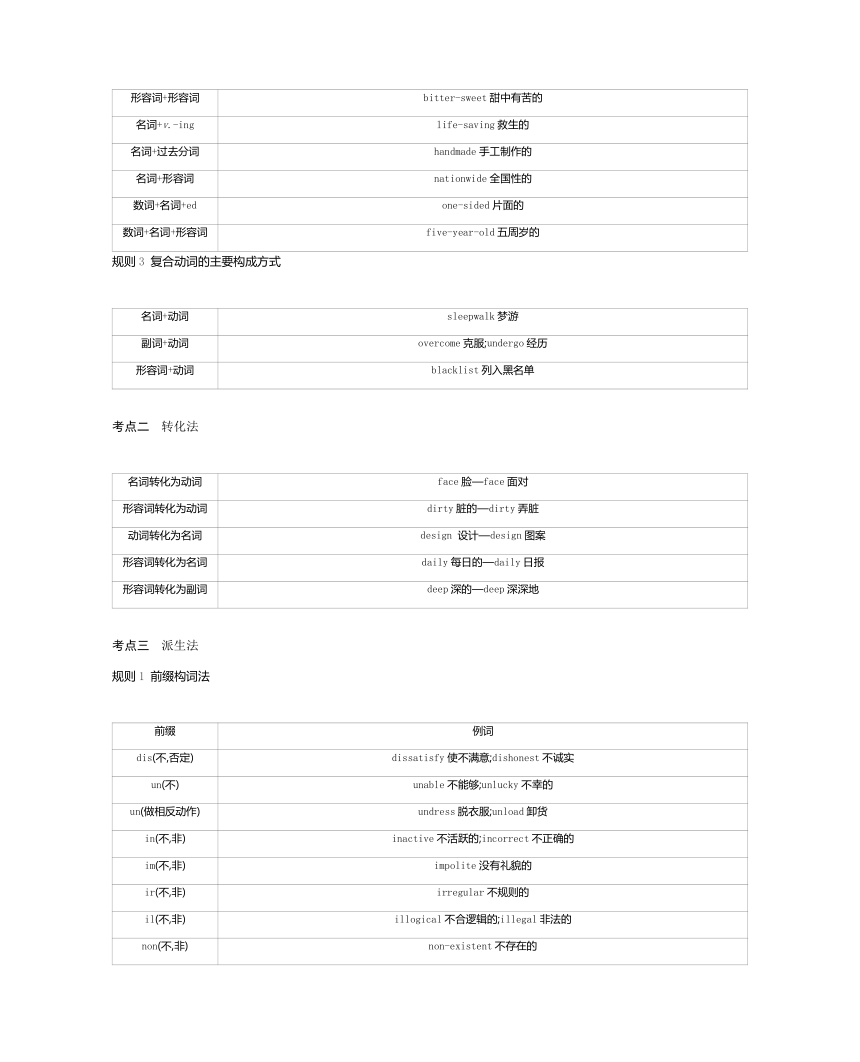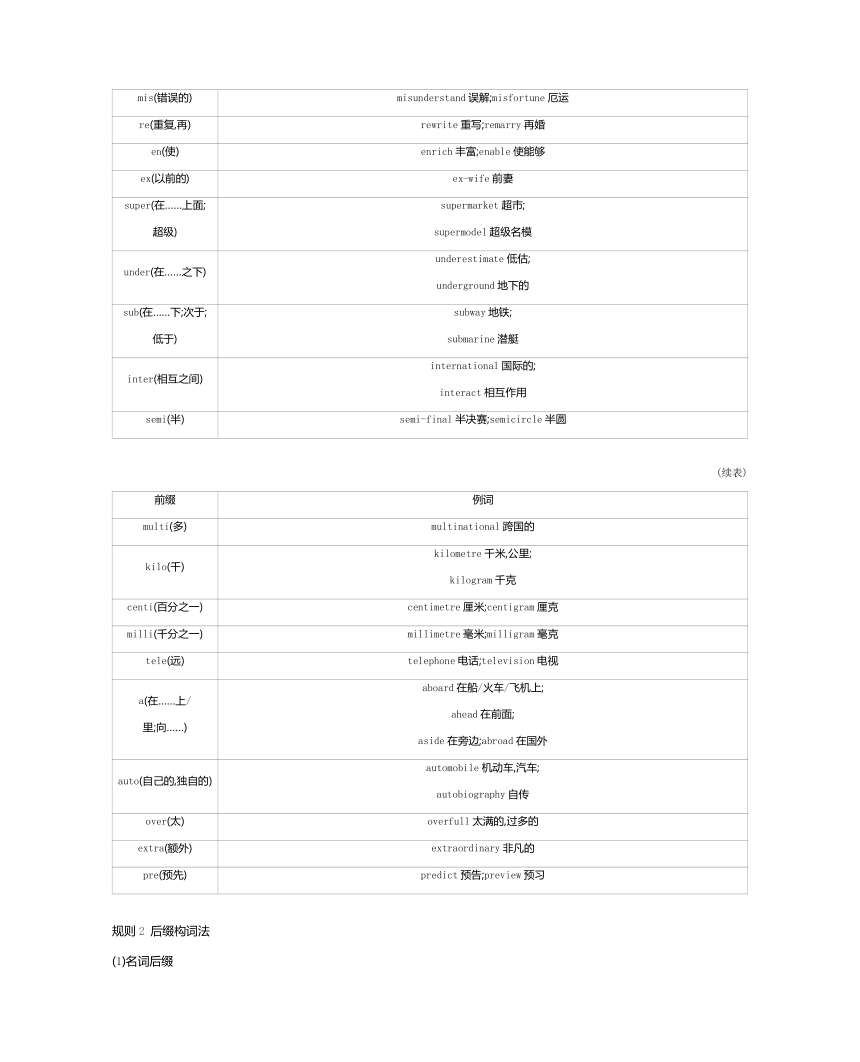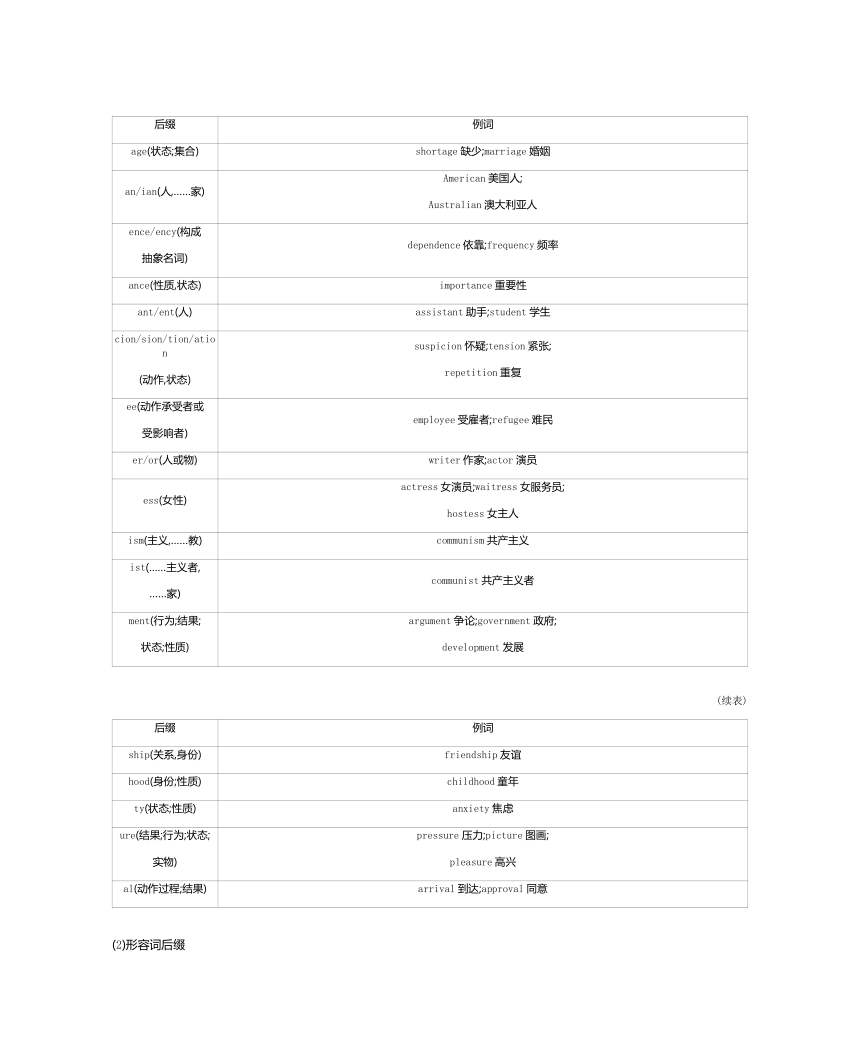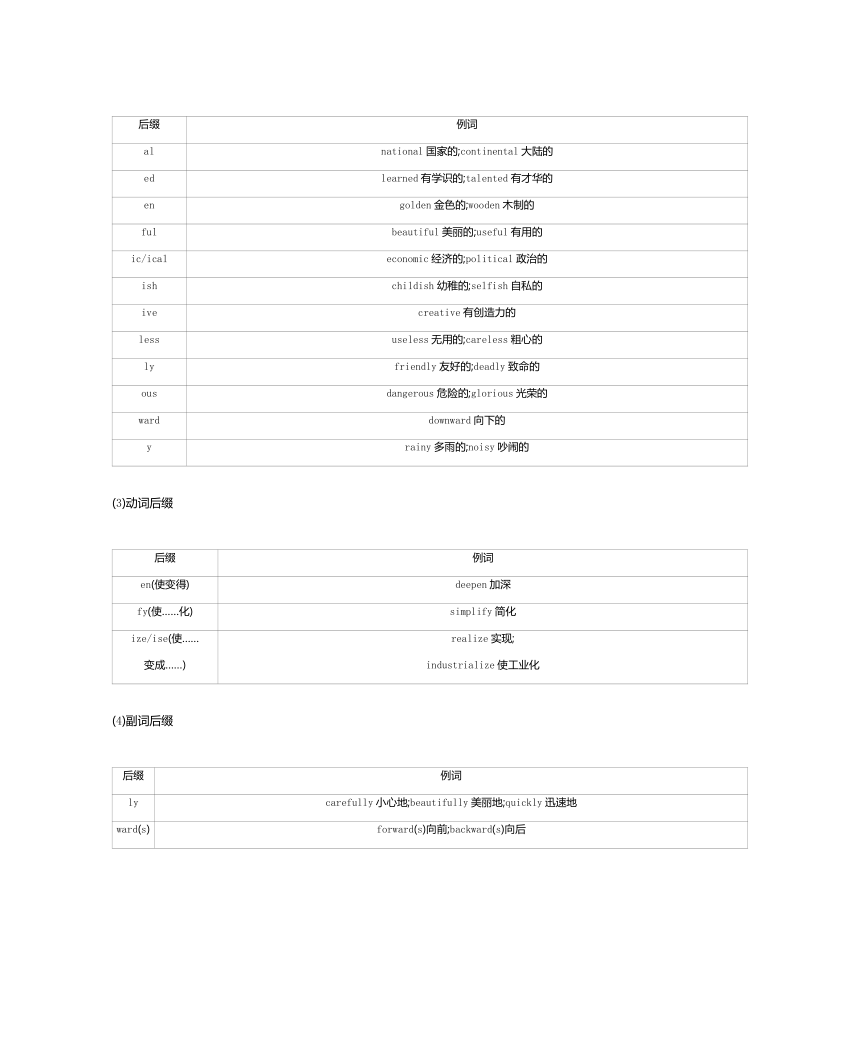高考英语复习:语法专题 专题14 正反解读构词法学案(含答案)
文档属性
| 名称 | 高考英语复习:语法专题 专题14 正反解读构词法学案(含答案) |

|
|
| 格式 | docx | ||
| 文件大小 | 154.5KB | ||
| 资源类型 | 教案 | ||
| 版本资源 | 通用版 | ||
| 科目 | 英语 | ||
| 更新时间 | 2023-05-02 00:00:00 | ||
图片预览





文档简介
专题14 正反解读构词法
1. She is determined to carry on with her (educate).
2.This development was only possible with the (introduce) of electric-powered engines and lifts.
3. Steam engines were used to pull the carriages and it must have been (fair) unpleasant for the passengers, with all the smoke and noise.
4.However, be (care) not to go to extremes.
5. I deeply respect her (determine) and ability to stand up for herself, and I am grateful to have such a positive role model.
考点一 合成法
规则1 复合名词的主要构成方式
名词+名词 silkworm蚕;classroom教室
形容词+名词 double-dealer两面派
v.-ing+名词 swimming pool游泳池
动词+名词 breakwater防波堤;pickpocket扒手
名词+v.-ing handwriting笔迹
动词+副词 get-together联欢会;breakthrough突破
副词+动词 downfall垮台;outbreak爆发
规则2 复合形容词的主要构成方式
形容词+名词+-ed cold-blooded冷酷的
形容词+名词 high-class高级的
形容词+v.-ing easy-going随和的
形容词+过去分词 newborn新生的
形容词+形容词 bitter-sweet甜中有苦的
名词+v.-ing life-saving救生的
名词+过去分词 handmade手工制作的
名词+形容词 nationwide全国性的
数词+名词+ed one-sided片面的
数词+名词+形容词 five-year-old五周岁的
规则3 复合动词的主要构成方式
名词+动词 sleepwalk梦游
副词+动词 overcome克服;undergo经历
形容词+动词 blacklist列入黑名单
考点二 转化法
名词转化为动词 face脸—face面对
形容词转化为动词 dirty脏的—dirty弄脏
动词转化为名词 design 设计—design图案
形容词转化为名词 daily每日的—daily日报
形容词转化为副词 deep深的—deep深深地
考点三 派生法
规则1 前缀构词法
前缀 例词
dis(不,否定) dissatisfy使不满意;dishonest不诚实
un(不) unable不能够;unlucky不幸的
un(做相反动作) undress脱衣服;unload卸货
in(不,非) inactive不活跃的;incorrect不正确的
im(不,非) impolite没有礼貌的
ir(不,非) irregular不规则的
il(不,非) illogical不合逻辑的;illegal非法的
non(不,非) non-existent不存在的
mis(错误的) misunderstand误解;misfortune厄运
re(重复,再) rewrite重写;remarry再婚
en(使) enrich丰富;enable使能够
ex(以前的) ex-wife前妻
super(在……上面; 超级) supermarket超市; supermodel超级名模
under(在……之下) underestimate低估; underground地下的
sub(在……下;次于; 低于) subway地铁; submarine潜艇
inter(相互之间) international国际的; interact相互作用
semi(半) semi-final半决赛;semicircle半圆
(续表)
前缀 例词
multi(多) multinational跨国的
kilo(千) kilometre千米,公里; kilogram千克
centi(百分之一) centimetre厘米;centigram厘克
milli(千分之一) millimetre毫米;milligram毫克
tele(远) telephone电话;television电视
a(在……上/ 里;向……) aboard在船/火车/飞机上; ahead在前面; aside在旁边;abroad在国外
auto(自己的,独自的) automobile机动车,汽车; autobiography自传
over(太) overfull太满的,过多的
extra(额外) extraordinary非凡的
pre(预先) predict预告;preview预习
规则2 后缀构词法
(1)名词后缀
后缀 例词
age(状态;集合) shortage缺少;marriage婚姻
an/ian(人,……家) American美国人; Australian澳大利亚人
ence/ency(构成 抽象名词) dependence依靠;frequency频率
ance(性质,状态) importance重要性
ant/ent(人) assistant助手;student学生
cion/sion/tion/ation (动作,状态) suspicion怀疑;tension紧张; repetition重复
ee(动作承受者或 受影响者) employee受雇者;refugee难民
er/or(人或物) writer作家;actor演员
ess(女性) actress女演员;waitress女服务员; hostess女主人
ism(主义,……教) communism共产主义
ist(……主义者, ……家) communist共产主义者
ment(行为;结果; 状态;性质) argument争论;government政府; development发展
(续表)
后缀 例词
ship(关系,身份) friendship友谊
hood(身份;性质) childhood童年
ty(状态;性质) anxiety焦虑
ure(结果;行为;状态; 实物) pressure压力;picture图画; pleasure高兴
al(动作过程;结果) arrival到达;approval同意
(2)形容词后缀
后缀 例词
al national国家的;continental大陆的
ed learned有学识的;talented有才华的
en golden金色的;wooden木制的
ful beautiful美丽的;useful有用的
ic/ical economic经济的;political政治的
ish childish幼稚的;selfish自私的
ive creative有创造力的
less useless无用的;careless粗心的
ly friendly友好的;deadly致命的
ous dangerous危险的;glorious光荣的
ward downward向下的
y rainy多雨的;noisy吵闹的
(3)动词后缀
后缀 例词
en(使变得) deepen加深
fy(使……化) simplify简化
ize/ise(使…… 变成……) realize实现; industrialize使工业化
(4)副词后缀
后缀 例词
ly carefully小心地;beautifully美丽地;quickly迅速地
ward(s) forward(s)向前;backward(s)向后
词性的误用
(1)【误】 I was supposed to arrive at the airport on time. Unfortunate, I was held up by the heavy traffic jam.
【正】 I was supposed to arrive at the airport on time. Unfortunately,I was held up by the heavy traffic jam.
[分析] Unfortunate改为Unfortunately。修饰整个句子作状语应用副词,根据句意可知应表示“不幸的是”,故将Unfortunate改为Unfortunately。
(2)【误】 You'd better take account of your able accurately before attempting to do such a business.
【正】 You'd better take account of your ability accurately before attempting to do such a business.
[分析] able改为ability。根据your可知此处应用名词ability,表示“能力”。句意:你最好在尝试做这笔生意前准确地考虑一下自己的能力。
(3)【误】 The black people were against slavery and fought for their freedom brave.
【正】 The black people were against slavery and fought for their freedom bravely.
[分析] brave改为bravely。修饰动词fought应用副词,故将brave改为bravely。
(4)【误】 Excellent oral and written communication skills in Chinese and English are of important.
【正】 Excellent oral and written communication skills in Chinese and English are of importance.
[分析] important改为importance。介词之后要接名词。故将important改为importance。be of importance=be important。
(5)【误】 However, in the past few months, the situation has worse considerably.
【正】 However, in the past few months, the situation has worsened considerably.
[分析] worse改为worsened。分析句子结构可知,此句缺少谓语动词,故用worsen表示“恶化”。句意:然而,在过去的几个月,情况恶化得相当严重。
Ⅰ.单句填空
1. In a good (marry), both husband and wife work hard to solve any problems that arise.
2. In a (danger) part of the sea off the coast of New Zealand, they learnt to look for a dolphin.
3. Teachers must try their best to make most of their students (interest) in the subject.
4. When China's ancient scientific and technological (achieve) are mentioned, the nation will generally refer to the Four Great Inventions.
5. To most young children, being laughed at by others is a(n) (pleasant) experience.
6. It was important for you to (write) the essay to polish it according to the editor's suggestion.
7. The parents were shocked by the news that their son needed an (operate) on his knee.
8. Wherever they went, they were (close) followed by security men.
9. There must be something (serious) wrong with our society.
10. People certainly have a variety of reasons for going back to school but one important thing to know is, no knowledge is (use).
11. The report has a detailed (describe) of what happened yesterday.
12. I followed her to the railway station and then she (appear) suddenly.
13. He hardly ever exercises. So he is kind of (health).
14. His teacher took a deep drink, smiled (warm), and thanked his student very much for the sweet water.
15. (fail) is such a common matter that every one of us may meet it from time to time.
Ⅱ.单句改错
1.The fruits are small in size, but juicy and taste.
2.We are growing wonderfully tomatoes at no cost!
3.The teachers here are kind and helpfully. They are not only our teachers but also our friends.
4.No one in the carriage had previous spoken to or even noticed the ticket-owner before.
5.That is too much for us, considering how closely the houses are.
Ⅲ.语法填空
American writer Theodor Seuss Geisel, better 1. (know) as “Dr Seuss”, is one of the world's most famous authors of books for children.
March 2, 2017 was his 113th birthday. He was born in 1904 in Massachusetts and 2. (die) in 1991. 3. his honour, March 2 is called both Dr Seuss Day and, in many places, World Book Day. The aim of the observance is to celebrate literature and urge children around the world to read.
Dr Seuss is famous for his fantastical and 4. (humour) books for young children. His books 5. (fill) with colourful pictures and fun rhymes. Dr Seuss' 6. (work) include The Cat in the Hat, Green Eggs and Ham and The Lorax.
Dr Seuss helped generations of children learn to read and to love reading. His books have been published in some 20 languages.
Many people used World Book Day 7. (express) thanks for Dr Seuss' books. If you missed out on World Book Day, you will have 8. chance later this year to celebrate books and reading. The United Nations marks World Book and Copyright Day on April 23. That is the date on 9. several of the world's 10. (great) writers died. They include England's William Shakespeare and Miguel de Cervantes of Spain.
专题14 正反解读构词法
【高考链接】
1.education 根据前面的with her可知,填educate的名词形式education。
2.introduction 根据with the可知,此处用introduce的名词形式introduction,表示“采用,引进”之意。
3.fairly 根据形容词unpleasant可知,此处需用副词fairly修饰形容词。
4.careful 分析语境可知be后面应该用形容词作表语,故填careful。
5.determination 根据her可知,填名词determination,表示“决定,决心”。
【实战演练】
Ⅰ.单句填空
1.marriage 在形容词后用名词marriage,表示“婚姻”。
2.dangerous 在冠词与名词之间要用形容词dangerous作定语表示“危险的”。
3.interested 所填词在句中作宾语most of their students的补足语,故用形容词interested表示“感兴趣的”。
4.achievements 作主语要用名词,根据are可知主语是复数,故填achievements。
5.unpleasant 根据句意“被别人嘲笑会使人不愉快”可知填unpleasant,表示“不愉快的,不舒服的”。
6.rewrite 根据语境“润色文章是需要重新改写的”可知填rewrite,表示“改写,重写”。
7.operation 在冠词后要用名词,故填operation。
8.closely 修饰动词followed作状语要用副词closely,表示“紧紧地”。
9.seriously 修饰形容词wrong作状语要用副词seriously,表示“严重地”。
10.useless 作表语要用形容词,结合句意“没有什么知识是无用的”可知填useless。
11.description 冠词修饰名词,故用名词形式。
12.disappeared 根据句意“我跟着她到了火车站,然后她突然消失了”可知填disappeared,表示“消失,不见”。
13.unhealthy 作表语用形容词,结合句意“他几乎不锻炼身体,所以有点儿不健康”可知填unhealthy,表示“不健康的”。
14.warmly 修饰动词smiled作状语要用副词形式,故填warmly。
15.Failure 作主语用名词failure,表示“失败”。
Ⅱ.单句改错
1.taste改为tasty 2. wonderfully改为wonderful
3.helpfully改为helpful 4. previous改为previously
5.closely改为close
Ⅲ.语法填空
【文章大意】 本文主要讲述了最著名的儿童图书作家之一——美国作家西奥多·苏斯·盖泽尔的生平以及为了纪念他而发起的 “苏斯博士日”活动。
1.known 考查非谓语动词。句子已有谓语,根据短语be known as可知,用过去分词known作后置定语,相当于定语从句who is better known…。be known as作为……而著称。
2.died 考查动词时态。根据“He was born in 1906 in Massachusetts and…”可知,此处应用一般过去时。
3.In 考查介词。in one's honour表示“纪念某人,向某人表示敬意”。
4.humorous 考查形容词。名词humour转换为形容词humorous(幽默的),作定语修饰名词books。
5.are filled 考查动词时态和主谓一致。be filled with表示“充满”,因books为复数名词,故填are filled。
6.works 考查名词复数。此处work是可数名词,意为“作品,著作”,其复数为works。
7.to express 考查非谓语动词。use sth to do…意为“用……来做……”,其中动词不定式作目的状语。
8.another 考查代词。表示“另一个,又一个” ,用another。
9.which 考查定语从句。此句是“介词+关系代词”型定语从句,先行词是date,故用which引导定语从句,并作介词on的宾语。on which指代on the date,相当于when。
10.greatest 考查形容词最高级。根据句意“世界上几位最伟大的作家在这一天去世”可知用最高级形式greatest。
1. She is determined to carry on with her (educate).
2.This development was only possible with the (introduce) of electric-powered engines and lifts.
3. Steam engines were used to pull the carriages and it must have been (fair) unpleasant for the passengers, with all the smoke and noise.
4.However, be (care) not to go to extremes.
5. I deeply respect her (determine) and ability to stand up for herself, and I am grateful to have such a positive role model.
考点一 合成法
规则1 复合名词的主要构成方式
名词+名词 silkworm蚕;classroom教室
形容词+名词 double-dealer两面派
v.-ing+名词 swimming pool游泳池
动词+名词 breakwater防波堤;pickpocket扒手
名词+v.-ing handwriting笔迹
动词+副词 get-together联欢会;breakthrough突破
副词+动词 downfall垮台;outbreak爆发
规则2 复合形容词的主要构成方式
形容词+名词+-ed cold-blooded冷酷的
形容词+名词 high-class高级的
形容词+v.-ing easy-going随和的
形容词+过去分词 newborn新生的
形容词+形容词 bitter-sweet甜中有苦的
名词+v.-ing life-saving救生的
名词+过去分词 handmade手工制作的
名词+形容词 nationwide全国性的
数词+名词+ed one-sided片面的
数词+名词+形容词 five-year-old五周岁的
规则3 复合动词的主要构成方式
名词+动词 sleepwalk梦游
副词+动词 overcome克服;undergo经历
形容词+动词 blacklist列入黑名单
考点二 转化法
名词转化为动词 face脸—face面对
形容词转化为动词 dirty脏的—dirty弄脏
动词转化为名词 design 设计—design图案
形容词转化为名词 daily每日的—daily日报
形容词转化为副词 deep深的—deep深深地
考点三 派生法
规则1 前缀构词法
前缀 例词
dis(不,否定) dissatisfy使不满意;dishonest不诚实
un(不) unable不能够;unlucky不幸的
un(做相反动作) undress脱衣服;unload卸货
in(不,非) inactive不活跃的;incorrect不正确的
im(不,非) impolite没有礼貌的
ir(不,非) irregular不规则的
il(不,非) illogical不合逻辑的;illegal非法的
non(不,非) non-existent不存在的
mis(错误的) misunderstand误解;misfortune厄运
re(重复,再) rewrite重写;remarry再婚
en(使) enrich丰富;enable使能够
ex(以前的) ex-wife前妻
super(在……上面; 超级) supermarket超市; supermodel超级名模
under(在……之下) underestimate低估; underground地下的
sub(在……下;次于; 低于) subway地铁; submarine潜艇
inter(相互之间) international国际的; interact相互作用
semi(半) semi-final半决赛;semicircle半圆
(续表)
前缀 例词
multi(多) multinational跨国的
kilo(千) kilometre千米,公里; kilogram千克
centi(百分之一) centimetre厘米;centigram厘克
milli(千分之一) millimetre毫米;milligram毫克
tele(远) telephone电话;television电视
a(在……上/ 里;向……) aboard在船/火车/飞机上; ahead在前面; aside在旁边;abroad在国外
auto(自己的,独自的) automobile机动车,汽车; autobiography自传
over(太) overfull太满的,过多的
extra(额外) extraordinary非凡的
pre(预先) predict预告;preview预习
规则2 后缀构词法
(1)名词后缀
后缀 例词
age(状态;集合) shortage缺少;marriage婚姻
an/ian(人,……家) American美国人; Australian澳大利亚人
ence/ency(构成 抽象名词) dependence依靠;frequency频率
ance(性质,状态) importance重要性
ant/ent(人) assistant助手;student学生
cion/sion/tion/ation (动作,状态) suspicion怀疑;tension紧张; repetition重复
ee(动作承受者或 受影响者) employee受雇者;refugee难民
er/or(人或物) writer作家;actor演员
ess(女性) actress女演员;waitress女服务员; hostess女主人
ism(主义,……教) communism共产主义
ist(……主义者, ……家) communist共产主义者
ment(行为;结果; 状态;性质) argument争论;government政府; development发展
(续表)
后缀 例词
ship(关系,身份) friendship友谊
hood(身份;性质) childhood童年
ty(状态;性质) anxiety焦虑
ure(结果;行为;状态; 实物) pressure压力;picture图画; pleasure高兴
al(动作过程;结果) arrival到达;approval同意
(2)形容词后缀
后缀 例词
al national国家的;continental大陆的
ed learned有学识的;talented有才华的
en golden金色的;wooden木制的
ful beautiful美丽的;useful有用的
ic/ical economic经济的;political政治的
ish childish幼稚的;selfish自私的
ive creative有创造力的
less useless无用的;careless粗心的
ly friendly友好的;deadly致命的
ous dangerous危险的;glorious光荣的
ward downward向下的
y rainy多雨的;noisy吵闹的
(3)动词后缀
后缀 例词
en(使变得) deepen加深
fy(使……化) simplify简化
ize/ise(使…… 变成……) realize实现; industrialize使工业化
(4)副词后缀
后缀 例词
ly carefully小心地;beautifully美丽地;quickly迅速地
ward(s) forward(s)向前;backward(s)向后
词性的误用
(1)【误】 I was supposed to arrive at the airport on time. Unfortunate, I was held up by the heavy traffic jam.
【正】 I was supposed to arrive at the airport on time. Unfortunately,I was held up by the heavy traffic jam.
[分析] Unfortunate改为Unfortunately。修饰整个句子作状语应用副词,根据句意可知应表示“不幸的是”,故将Unfortunate改为Unfortunately。
(2)【误】 You'd better take account of your able accurately before attempting to do such a business.
【正】 You'd better take account of your ability accurately before attempting to do such a business.
[分析] able改为ability。根据your可知此处应用名词ability,表示“能力”。句意:你最好在尝试做这笔生意前准确地考虑一下自己的能力。
(3)【误】 The black people were against slavery and fought for their freedom brave.
【正】 The black people were against slavery and fought for their freedom bravely.
[分析] brave改为bravely。修饰动词fought应用副词,故将brave改为bravely。
(4)【误】 Excellent oral and written communication skills in Chinese and English are of important.
【正】 Excellent oral and written communication skills in Chinese and English are of importance.
[分析] important改为importance。介词之后要接名词。故将important改为importance。be of importance=be important。
(5)【误】 However, in the past few months, the situation has worse considerably.
【正】 However, in the past few months, the situation has worsened considerably.
[分析] worse改为worsened。分析句子结构可知,此句缺少谓语动词,故用worsen表示“恶化”。句意:然而,在过去的几个月,情况恶化得相当严重。
Ⅰ.单句填空
1. In a good (marry), both husband and wife work hard to solve any problems that arise.
2. In a (danger) part of the sea off the coast of New Zealand, they learnt to look for a dolphin.
3. Teachers must try their best to make most of their students (interest) in the subject.
4. When China's ancient scientific and technological (achieve) are mentioned, the nation will generally refer to the Four Great Inventions.
5. To most young children, being laughed at by others is a(n) (pleasant) experience.
6. It was important for you to (write) the essay to polish it according to the editor's suggestion.
7. The parents were shocked by the news that their son needed an (operate) on his knee.
8. Wherever they went, they were (close) followed by security men.
9. There must be something (serious) wrong with our society.
10. People certainly have a variety of reasons for going back to school but one important thing to know is, no knowledge is (use).
11. The report has a detailed (describe) of what happened yesterday.
12. I followed her to the railway station and then she (appear) suddenly.
13. He hardly ever exercises. So he is kind of (health).
14. His teacher took a deep drink, smiled (warm), and thanked his student very much for the sweet water.
15. (fail) is such a common matter that every one of us may meet it from time to time.
Ⅱ.单句改错
1.The fruits are small in size, but juicy and taste.
2.We are growing wonderfully tomatoes at no cost!
3.The teachers here are kind and helpfully. They are not only our teachers but also our friends.
4.No one in the carriage had previous spoken to or even noticed the ticket-owner before.
5.That is too much for us, considering how closely the houses are.
Ⅲ.语法填空
American writer Theodor Seuss Geisel, better 1. (know) as “Dr Seuss”, is one of the world's most famous authors of books for children.
March 2, 2017 was his 113th birthday. He was born in 1904 in Massachusetts and 2. (die) in 1991. 3. his honour, March 2 is called both Dr Seuss Day and, in many places, World Book Day. The aim of the observance is to celebrate literature and urge children around the world to read.
Dr Seuss is famous for his fantastical and 4. (humour) books for young children. His books 5. (fill) with colourful pictures and fun rhymes. Dr Seuss' 6. (work) include The Cat in the Hat, Green Eggs and Ham and The Lorax.
Dr Seuss helped generations of children learn to read and to love reading. His books have been published in some 20 languages.
Many people used World Book Day 7. (express) thanks for Dr Seuss' books. If you missed out on World Book Day, you will have 8. chance later this year to celebrate books and reading. The United Nations marks World Book and Copyright Day on April 23. That is the date on 9. several of the world's 10. (great) writers died. They include England's William Shakespeare and Miguel de Cervantes of Spain.
专题14 正反解读构词法
【高考链接】
1.education 根据前面的with her可知,填educate的名词形式education。
2.introduction 根据with the可知,此处用introduce的名词形式introduction,表示“采用,引进”之意。
3.fairly 根据形容词unpleasant可知,此处需用副词fairly修饰形容词。
4.careful 分析语境可知be后面应该用形容词作表语,故填careful。
5.determination 根据her可知,填名词determination,表示“决定,决心”。
【实战演练】
Ⅰ.单句填空
1.marriage 在形容词后用名词marriage,表示“婚姻”。
2.dangerous 在冠词与名词之间要用形容词dangerous作定语表示“危险的”。
3.interested 所填词在句中作宾语most of their students的补足语,故用形容词interested表示“感兴趣的”。
4.achievements 作主语要用名词,根据are可知主语是复数,故填achievements。
5.unpleasant 根据句意“被别人嘲笑会使人不愉快”可知填unpleasant,表示“不愉快的,不舒服的”。
6.rewrite 根据语境“润色文章是需要重新改写的”可知填rewrite,表示“改写,重写”。
7.operation 在冠词后要用名词,故填operation。
8.closely 修饰动词followed作状语要用副词closely,表示“紧紧地”。
9.seriously 修饰形容词wrong作状语要用副词seriously,表示“严重地”。
10.useless 作表语要用形容词,结合句意“没有什么知识是无用的”可知填useless。
11.description 冠词修饰名词,故用名词形式。
12.disappeared 根据句意“我跟着她到了火车站,然后她突然消失了”可知填disappeared,表示“消失,不见”。
13.unhealthy 作表语用形容词,结合句意“他几乎不锻炼身体,所以有点儿不健康”可知填unhealthy,表示“不健康的”。
14.warmly 修饰动词smiled作状语要用副词形式,故填warmly。
15.Failure 作主语用名词failure,表示“失败”。
Ⅱ.单句改错
1.taste改为tasty 2. wonderfully改为wonderful
3.helpfully改为helpful 4. previous改为previously
5.closely改为close
Ⅲ.语法填空
【文章大意】 本文主要讲述了最著名的儿童图书作家之一——美国作家西奥多·苏斯·盖泽尔的生平以及为了纪念他而发起的 “苏斯博士日”活动。
1.known 考查非谓语动词。句子已有谓语,根据短语be known as可知,用过去分词known作后置定语,相当于定语从句who is better known…。be known as作为……而著称。
2.died 考查动词时态。根据“He was born in 1906 in Massachusetts and…”可知,此处应用一般过去时。
3.In 考查介词。in one's honour表示“纪念某人,向某人表示敬意”。
4.humorous 考查形容词。名词humour转换为形容词humorous(幽默的),作定语修饰名词books。
5.are filled 考查动词时态和主谓一致。be filled with表示“充满”,因books为复数名词,故填are filled。
6.works 考查名词复数。此处work是可数名词,意为“作品,著作”,其复数为works。
7.to express 考查非谓语动词。use sth to do…意为“用……来做……”,其中动词不定式作目的状语。
8.another 考查代词。表示“另一个,又一个” ,用another。
9.which 考查定语从句。此句是“介词+关系代词”型定语从句,先行词是date,故用which引导定语从句,并作介词on的宾语。on which指代on the date,相当于when。
10.greatest 考查形容词最高级。根据句意“世界上几位最伟大的作家在这一天去世”可知用最高级形式greatest。
